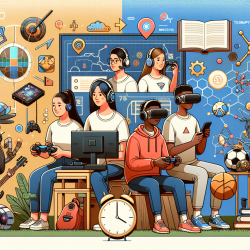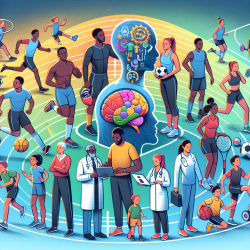Introduction
The integration of eSports programs in high schools has sparked significant debate regarding their potential impact on adolescent development. The research article "ESport programs in high school: what’s at play?" by Lemay et al. (2024) provides a comprehensive examination of the characteristics and consequences associated with high school eSports participation. This blog aims to distill the findings of this study to help practitioners enhance their skills and encourage further research into the implications of eSports in educational settings.
Key Findings
The study compared 67 adolescent eSports players (ESp) with 109 recreational gamers (nESp) in high schools, focusing on sociodemographic, academic, and psychological characteristics. The results revealed several critical insights:
- Screen Time: ESp spend significantly more time on online activities compared to nESp, averaging 50 hours per week versus 32 hours for nESp. This elevated screen time could potentially interfere with their academic performance.
- Gaming Disorder Risk: A higher proportion of ESp are considered potential problematic gamers, with 32.8% of ESp showing signs of gaming disorder compared to 12.8% of nESp.
- Perceived Consequences: ESp report both positive and negative consequences from gaming. Positively, they perceive improvements in social relationships and general motivation. Negatively, they report adverse effects on their education and sleep.
Implications for Practitioners
For practitioners working with adolescents in educational settings, these findings underscore the importance of a balanced approach to eSports programs. Here are some actionable strategies:
- Screen Time Management: Encourage students to monitor and manage their screen time to prevent potential academic and health issues.
- Early Detection of Gaming Disorder: Implement screening tools to identify students at risk of developing gaming disorders and provide targeted interventions.
- Holistic Program Design: Design eSports programs that emphasize both the positive aspects of gaming, such as socialization and skill development, and address potential negative impacts like excessive screen time.
Encouraging Further Research
The study highlights the need for further research into the long-term effects of eSports participation on adolescents. Practitioners are encouraged to collaborate with researchers to explore:
- The impact of eSports on academic performance and mental health over time.
- The effectiveness of various intervention strategies in mitigating negative outcomes associated with eSports.
- The role of parental involvement and school policies in shaping the experiences of adolescent eSports players.
To read the original research paper, please follow this link: ESport programs in high school: what’s at play?










